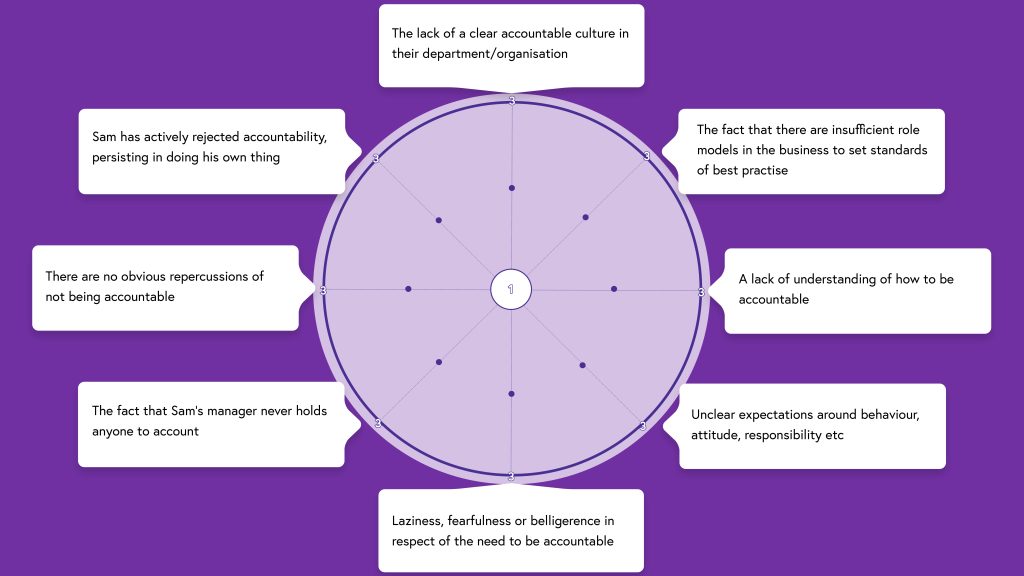Creating a culture of accountability – are we there yet?

Have we all given up on trying to create a culture of accountability? Pre-Pandemic I met with a lot of teams who were working hard to embed accountability across their organisations. Now it has all gone quiet. Eerily so…
Perhaps you all cracked that particular nut … or perhaps the nut got buried and forgotten?
So what happened?
In simple terms the Pandemic happened.
Staff went home or were furloughed whilst other staff worked their socks off. Organisations mostly went into crisis management. HR teams dropped everything except the most urgent matters. Governments treated everyone like children, starting with telling us how to wash our hands. Numerous bored or attention phobic adults at home got a Netflix addiction, whilst others experienced huge explosions of anxiety in response to the endless fear messaging and managers found themselves unable to decide how, when or even ‘if’ to manage their remote working employees.
Interestingly post pandemic, many managers still can’t decide how best to manage, whilst newly empowered employees sometimes believe that any kind of management undermines their mental wellbeing and that it is unfair and unkind for leaders to lead and managers to manage.
How best to manage
Three years since our first lockdowns and frustrated leaders and managers often wonder how to regain some semblance of control. The decision on this seems to be swinging between two polar opposite leadership styles: autocratic and laissez faire…presumably the latter with fingers crossed behind their backs hoping for the best.
However, neither style is working well.
And as we all know when employees are unhappy they are more likely to strike, resign, quiet quit or raise grievances. As a result, HR, in many organisations, continues to firefight the challenges.
It’s a complex situation but today we wanted to focus on a topic close to our hearts at Jaluch … accountability. Having a team who are accountable makes the business flow smoothly.
An accountability scenario: thinking about Sam
Sam becomes unwell whilst at work and goes home without informing anyone.
Accountability is about being able to account for your actions. Going home and not letting anyone know is not an accountable behaviour.
But the cause of Sam’s unaccountability, in most of the organisations we have worked with, is not always clear.
Clarity always helps us shape goals and targets, so to identify where to focus your energy, here is our …
Accountability check wheel
There are eight potential reasons for Sam’s unaccountability displayed around the wheel. As you read each reason, think about the impact it has had on Sam’s accountability. 1 (low impact) – 3 (high impact).
Is Sam’s failure to communicate down to …

More example situations for you to think about:
- You now have so few employees in the office on most days that you cannot guarantee that your existing trained first aiders might be on site on any given day. You decide to train more up but, despite numerous requests, no one is stepping forward. Do employees no longer want to take on these kind of positions of responsibility? How can you fulfil first aider requirements if no employees want to do the job anymore?
- Your ED&I committee keeps telling the leadership team to prioritise ED&I, set quotas, organise training, set up support groups etc and regularly tells all staff that the leadership team is not doing enough. The ED&I committee believes it has the remit to drive decision making across the business in respect of diversity and inclusion issues. The leadership team believe the ED&I committee operates in ‘victim’ mode, expecting others to be responsible for cultural change and that it is not accountable for the employee upset that is being caused.
- A director yells at a junior employee in front of about 20 other people. His behaviour is inappropriate and bullying. Other directors observe this, but none step forward. Why are these directors not accountable? Why did they not step forward when the business has clear policies on dignity at work and what behaviour is and is not acceptable?
Clarity can drive actions
Once you have clarity on the cause of the behaviour you can take the necessary action.
From analysing the Sam situation (or others that you can better relate to) what is the one area of weakness in your organisation? Where do you put your energy first?
Learn more
Fancy playing our accountability game? We use this as part of our leadership programme but we’re opening it up for everyone to play for a few weeks!
If you’re interested in developing an accountable culture in your organisation, take a look at our accountability training.
Thoughts, comments, opinions? Leave them below, we’d love to hear from you …
Disclaimer: The information contained within this article is for general guidance only and represents our understanding of employment and associated law and employee relations issues as at the date of publication. Jaluch Limited, or any of its directors or employees, cannot be held responsible for any action or inaction taken in reliance upon the contents. Specific advice should be sought on all individual matters.
